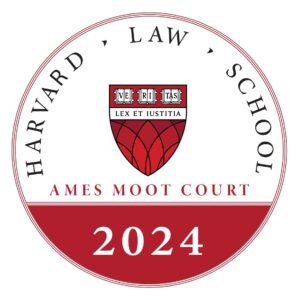The Ames Competition is one of the most prestigious competitions for appellate brief writing and advocacy in the country. Students participating in the Final Round started the competition in the fall of their 2L year. From there, two teams progress to the Final Round through their strong research abilities and excellent written and oral advocacy. The Final Round is traditionally judged by this country’s preeminent jurists. Past Ames Competition winners include Professor Cass Sunstein, Dean Kathleen Sullivan, Massachusetts Governor Deval Patrick, and Justice Harry Blackmun. Click here for a list of past winners of the Competition.
Congratulations to The Honorable Constance Baker Motley Memorial Team on winning Best Overall Team in the 2024 Ames Moot Court Final!
2024 Final Round
The Honorable Patti B. Saris
United States District Court for the District of Massachusetts
The Honorable Joan L. Larsen
United States Court of Appeals for the Sixth Circuit
Read the Parties’ Briefs:
The Case – Daniel Welles v. John Doe
John Doe, an undocumented immigrant residing in Ames City with strong community ties, including family and civic involvement, seeks legal protection to possess a firearm for self-defense due to neighborhood safety concerns. 18 U.S.C. § 922(g)(5)(A) prohibits firearm possession by individuals unlawfully present in the United States. Doe challenged this restriction, arguing that it violates his Second Amendment rights.
The District Court upheld the federal restriction, referencing prior circuit precedent that excluded undocumented immigrants from Second Amendment protections. The Court of Appeals reversed, reevaluating the issue under the Supreme Court’s ruling in New York State Rifle & Pistol Ass’n v. Bruen. The Court of Appeals concluded that Doe has sufficient ties to be part of “the people” under the Second Amendment and found insufficient historical evidence to justify disarming him solely based on his immigration status.
The Supreme Court has now granted certiorari to address two key questions:
- Whether a noncitizen unlawfully present in the United States but with substantial ties to the country is part of “the people” with Second Amendment rights.
- Whether the government can disarm noncitizens unlawfully present in the United States but with substantial ties to the country, consistent with the history of the Second Amendment.
The Competitors
The Honorable Constance Baker Motley Memorial Team (Respondent)
- Elle Buellesbach
- Vaishalee Chaudhary
- Andrew Cogut
- Alex Fredman
- Sophia Kwende
- Alexandra (“Mac”) Taylor
The Honorable Justice Sandra Day O’Connor Memorial Team (Petitioner)
- Arvind Ashok
- Edward (“Ned”) Bless
- Andrew Hayes
- Emily Malpass
- Richard Nehrboss
- Daniel Wasserman
—
For more information, please email [email protected].

